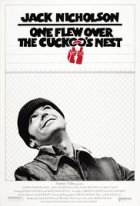
One Flew Over the Cuckoo's Nest
- R
- Year:
- 1975
- 133 min
- 3,678 Views
EXT. WORK FARM - NIGHTFALL
All we SEE is an ELEVATED SHOT of the distant mountains,
rolling landscape and McMURPHY -- one cheek laid-open and
crusted over with dried blood, his face and prison work
clothes caked with dried sweat and dust -- as he sits on the
very top of a water tower watching the last rays of sunlight.
A long moment passes before McMurphy's attention is drawn
elsewhere and he looks down.
REVERSE SHOT - McMURPHY'S POV
Far below, in the prison yard a MAN is SEEN hurrying acrcss
the yard where he joins a group of men composed of armed
prison guards, officials, and medics -- a stretcher, an
ambulance, a fire truck and safety nets spread out at the
base of the water tower. The man is seen talking to the
officials, then a bullhorn is handed to him and they all look
up at McMurphy.
McMURPHY
As he looks down at them, a searchlight is turned on him.
MAN (V.O.)
(through bullhorn)
McMurphy! This is Doctor Shankle,
from the infirmary. Can you hear
me?
McMurphy doesn't respond.
SHANKLE (V.O.)
(through bullhorn)
Can you hear me, McMurphy?
McMurphy doesn't respond. Another searchlight goes on as a
SECOND VOICE is PICKED UP on the BULLHORN.
SECOND VOICE:
(through bullhorn)
Why don't we blast 'im, for Christ
sake, he ain't gonna come down...
you...
The BULLHORN is TURNED OFF. A long moment passes as McMurphy
continues to squat on the tower and wait. He shivers against
the coming night when...
SHANKLE (V.O.)
(through bullhorn)
McMurphy!
I have the warden's promise. If you
come down, nobody will hurt you!
You'll be in my custody! I promise!
An imperceptible smile appears on McMurphy's face.
INT. MEN'S DORM - OREGON STATE HOSPITAL - DAWN
Strange HUMMING SOUNDS, CLANKING PIPES and HISSING RADIATORS
as we see beds, with patients lying asleep, line two walls.
The third wall is a heavy gauge steel grill, with a door that
opens on to the day room. The door is open. On the far side
of the day room, a long hallway with other doors opening into
rooms:
the latrine, washroom, tub room, mess hall, seclusionroom, psychiatrist's office, visitors' room, etc.
Across the day room, a glass enclosed nurses' station where
TURKLE, a Negro night attendant, is seen preparing to go off
duty.
The CAMERA PANS the beds in the men's dorm. One man turns,
another twists, a third lies as if dead.
CAMERA PAN ENDS on BROMDEN, who lies still, eyes wide open,
very alert. He reaches down, plucks a stale piece of gum from
under the bed frame, puts it in his mouth and starts chewing.
A beat, then Bromden carefully undoes the leather strap which
binds him to the bed. He slips out of bed and quietly makes
his way down the aisle, paying no attention to the other
patients, some of who are beginning to stir awake.
Ahead, at the end of the hallway, the door opens and three
Negro day attendants, WASHINGTON, WARREN and MILLER, dressed
in white uniforms, enter and move down the hallway and
disappear into a side room.
Bromden continues his silent journey towards the day room as
Turkle emerges from the side door to the nurses' lounge, goes
up the hallway as MISS PILBOW, the day nurse, comes in,
passing Turkle on the way out. She crosses to the nurses'
station and enters as Bromden reaches the day room.
INT. DAY ROOM - DAY
as Bromden makes his way across the day room, past the
nurses' station, unnoticed by Miss Pilbow who is busy
preparing the day's medication.
Bromden is sliding along the hallway wall, when he is
suddenly cut off by a mop which THUDS against one side of his
neck. A second mop yokes him on the other side. Bromden
freezes. Terrified.
Translation
Translate and read this script in other languages:
Select another language:
- - Select -
- 简体中文 (Chinese - Simplified)
- 繁體中文 (Chinese - Traditional)
- Español (Spanish)
- Esperanto (Esperanto)
- 日本語 (Japanese)
- Português (Portuguese)
- Deutsch (German)
- العربية (Arabic)
- Français (French)
- Русский (Russian)
- ಕನ್ನಡ (Kannada)
- 한국어 (Korean)
- עברית (Hebrew)
- Gaeilge (Irish)
- Українська (Ukrainian)
- اردو (Urdu)
- Magyar (Hungarian)
- मानक हिन्दी (Hindi)
- Indonesia (Indonesian)
- Italiano (Italian)
- தமிழ் (Tamil)
- Türkçe (Turkish)
- తెలుగు (Telugu)
- ภาษาไทย (Thai)
- Tiếng Việt (Vietnamese)
- Čeština (Czech)
- Polski (Polish)
- Bahasa Indonesia (Indonesian)
- Românește (Romanian)
- Nederlands (Dutch)
- Ελληνικά (Greek)
- Latinum (Latin)
- Svenska (Swedish)
- Dansk (Danish)
- Suomi (Finnish)
- فارسی (Persian)
- ייִדיש (Yiddish)
- հայերեն (Armenian)
- Norsk (Norwegian)
- English (English)
Citation
Use the citation below to add this screenplay to your bibliography:
Style:MLAChicagoAPA
"One Flew Over the Cuckoo's Nest" Scripts.com. STANDS4 LLC, 2025. Web. 8 Mar. 2025. <https://www.scripts.com/script/one_flew_over_the_cuckoo's_nest_1204>.






Discuss this script with the community:
Report Comment
We're doing our best to make sure our content is useful, accurate and safe.
If by any chance you spot an inappropriate comment while navigating through our website please use this form to let us know, and we'll take care of it shortly.
Attachment
You need to be logged in to favorite.
Log In